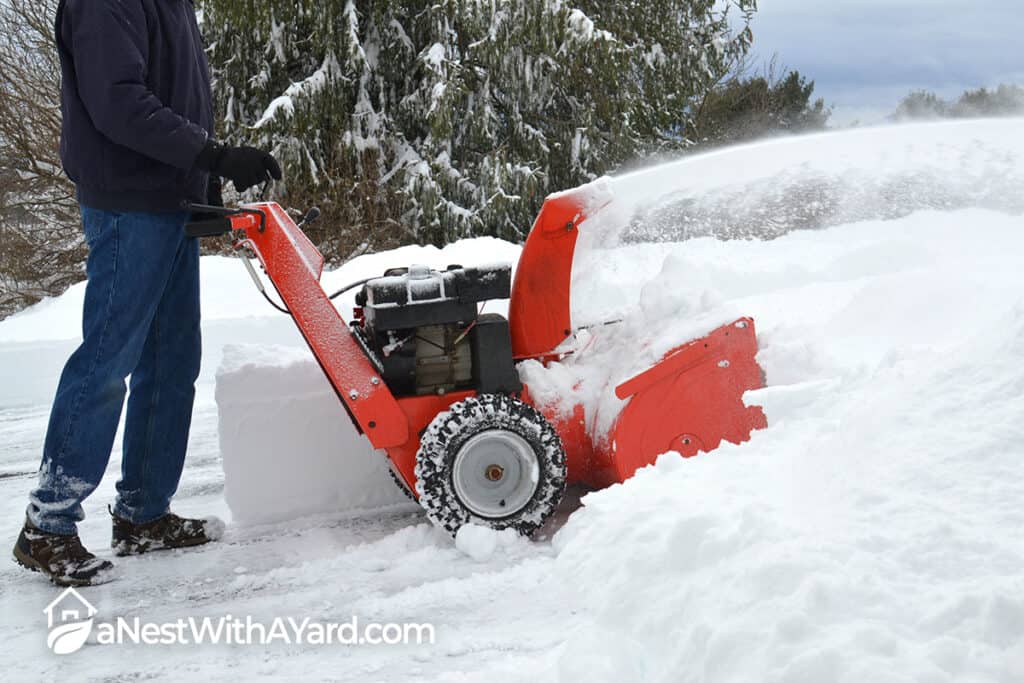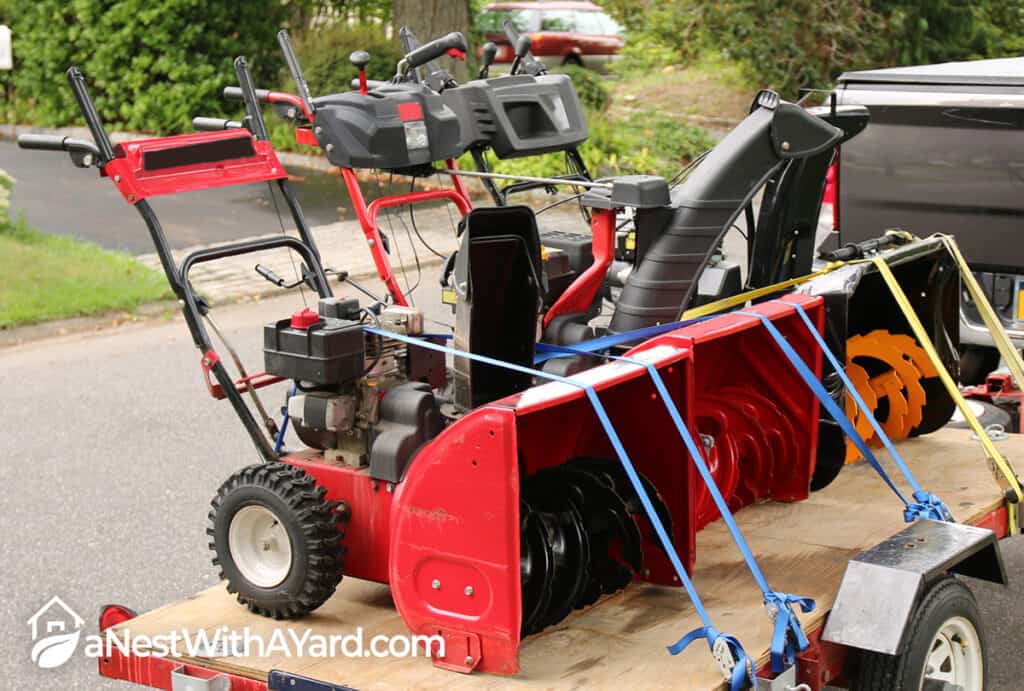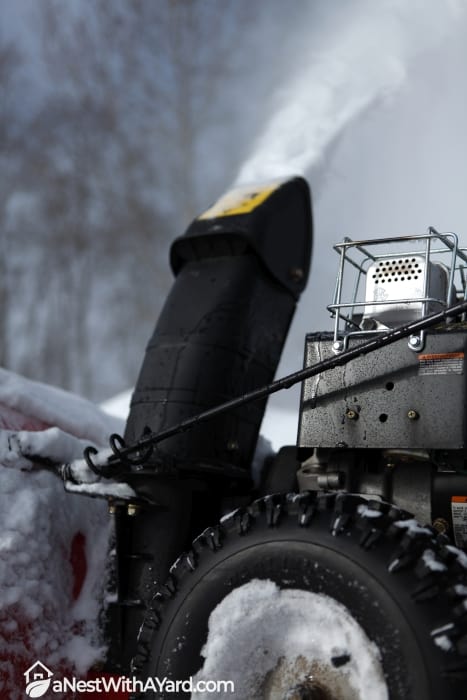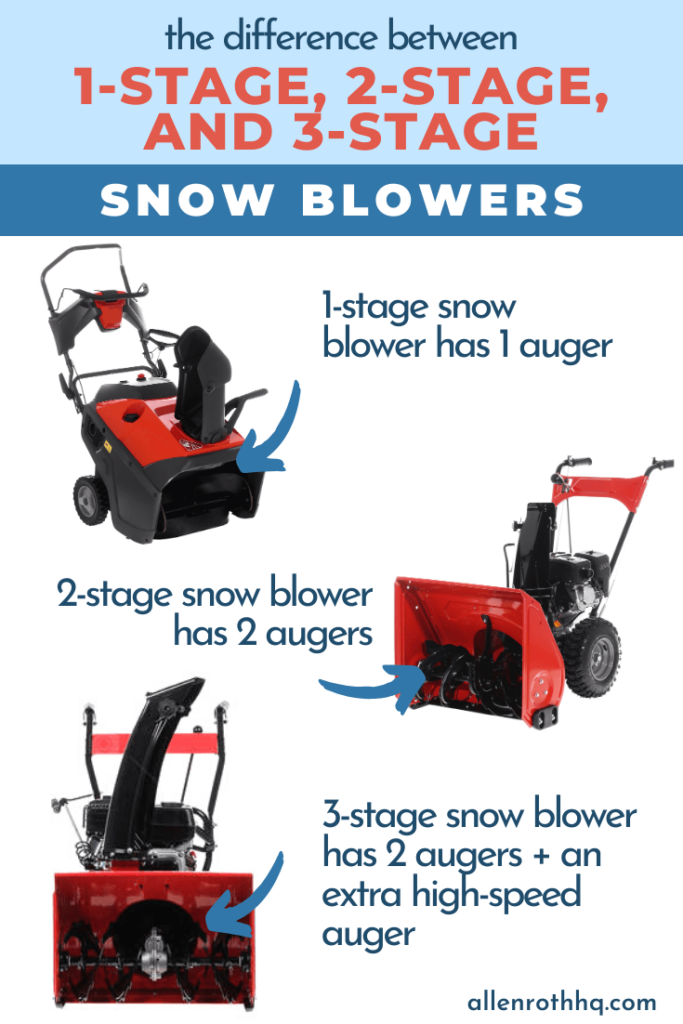How Long Do Snow Blower’s Last? Answering In (2022)

Buying a snow blower can be a pricey affair. For this reason, you want to ensure that you’re investing in something that is going to last. The longevity of your snow blower depends on the quality of the product, as well as how you store and maintain your machine.
Investing in a snow blower is a surefire way to make your winter maintenance a pleasant and painless experience. The time spent clearing snow off your driveway or sidewalk will be halved and you’ll avoid the laborious task of shoveling snow. However, it cannot be denied that a new snow blower can come at a hefty price.
For this reason, it is important to consider how long your snowblower will last and whether it is, in fact, worth it. Keep reading to find out everything you need to know about how long you can expect your snow blower to last!
What Influences A Snow Blower’s Lifespan?

How long your snow blower lasts is largely dependent on how well you look after it. The quality of the snow blower will obviously impact the product’s longevity, but there are also steps that you can take to ensure that your snow blower lives a long and healthy life.
Snow blowers are quite the investment, so it’s best to keep them running like a well-oiled machine (literally) than neglect to maintain them. Here are some simple steps that you can take to ensure your snowblower is kept in prime condition and sticks around for more than a few winters.
How you store your snowblower off-season is the most important thing to consider. This can do wonders for its longevity. Don’t be alarmed if your machine struggles to get going on its first use in winter. This is perfectly normal and should be expected. But, if you have stored your machine correctly, it should be up and running in no time.
Another critical factor to keep in mind is how much snow you receive in the region you live in. Using your snowblower more frequently will result in it being worn out more than others. Harsh weather conditions resulting in wet snow, rough terrain due to gravel driveways and quality are some other important factors to keep in mind.
When getting your snowblower ready to use after summer, the first thing that you should do is drain any stale fuel that may have been left in your snow blower and give your carburetor a thorough clean. Then check the position of all switches, your ignition key and the condition of your spark plug (it might be due for a replacement!).
If your snowblower still gives your trouble after this, it could indicate that there is some other type of damage that warrants taking it in for repairs.
Need to get your snowblower ready for the winter season? Read this to find out how to winterize your snowblower!
4 Tips For Storing Your Snow Blower During The Off-Season
Let’s look at a few things that you can do before putting your snowblower away for the summer.
drain the tank
Fuel that is left in the tank will go stale and can potentially clog and damage your carburetor, fuel lines and injectors. This will result in your snowblower refusing to start. Although this can be rectified, prevention is always better than cure.
If you cannot drain your snowblower through a fuel line or with a siphon pump, try running it dry or using a fuel stabilizer to prevent it from going stale.
Wipe Down Your Snowblower
This is a simple step that can make a big difference. Using a clean cloth and a mild soap solution, wipe down your snowblower to remove any salt stains that can be corrosive in the long term. If you want to be extra cautious, you can also use a rust-prevention spray on your machine.
Cover Your Snowblower
Once you’ve done all of the above, it is time to put your snowblower into storage until next winter. Before you do though, it is essential that you cover it to protect it from dust and, again, moisture.
Covering your snowblower is one of the most important steps to ensuring that it’s protected. Without proper coverage, you could end up with a flooded snowblower or one that’s covered with dust and dirt.
Some snow blowers will come with their own covers which is the ideal option. If your snowblower does not come with a cover, you can use a tarp
Are you in the market for a new snowblower and don’t know how or when to pick your perfect fit? Have a look at this video by YouTube user Pest and Lawn Ginja for 5 things to consider before settling on a new snowblower:
Store Your Snow Blower Safely
The ideal storage place for snow blowers is a Garage or similar indoor facility. You’re looking for a space that is sheltered, dry and uncluttered. Putting your snowblower in an overcrowded space can increase the risk of it getting scraped and damaged. I also recommend that you keep it raised off the ground or place it on a mat of some sort.
Even if you take all these steps, there is a good chance that your snowblower will show some resistance when the next winter rolls around. This isn’t a sign that your snowblower needs to be repaired or replaced. It simply needs some time and tweaks to fire it back into action.
Looking for more ways to get your snow blower to last longer? Check out this video by YouTube user Garage Gear for some tips on how to make your snow blower “last a lifetime”:
Types Of Snow Blowers

As discussed above, proper maintenance is what will ensure the longevity of your snow blower. In order to give your machine the best treatment, you need to be familiar with the type of snow blower you have and what it needs to run at its best. A key feature that sets snow blowers apart is the power source. The main categories to choose from include gas-powered, electric and even battery-powered snow blowers.
Gas powered snow blowers
Gas-powered snow blowers are the most common type. They’re durable, widely available, and ideal for large areas. Gas-powered snow blowers, however, are generally more maintenance-heavy because they require regular oil changes and other regular checkups and changes.

Electric snow blowers
Electric snow blowers are perhaps less common. They are generally cheaper, lighter and easier to move around, making them ideal for smaller homeowners. Without the need to continuously clean out an electric snow blower or regularly change the oil, maintenance time is greatly decreased.
However, when it comes to repairs, an electric snowblower can be pricer and it is often cheaper to replace the entire snowblower than get it repaired. The lifespan of an electric snowblower could therefore be considered less than that of a gas powered snowblower.
Although electric snow blowers are usually cheaper, there are ways of getting your gas powered snow blower at a reasonable price. As it is such a seasonal piece of equipment, the price of snow blowers varies greatly throughout the year. Being strategic about when you buy your snowblower can save you a considerable amount.
The functioning of your snowblower will also be determined by whether it is a single stage snow blower, two stage snow blower or three stage snow blower. This refers to how many steps there are between the snow entering and exiting your snowblower.
Single stage snow blowers
With single stage snow blowers, a set of rotating blades that resemble a drill bit, known as the auger, picks up the snow and expels it through the discharge chute. The snow is not so much blown as it is thrown to the side.
Two Stage Snow Blowers
A two stage snow blower will have an auger that collects the snow, breaks it up and then discharges it. This can work quicker than the single-stage snowblower. The ability to break particles up makes the two-stage snowblower more versatile as it can work on a variety of terrains without the risk of shooting out stones or gravel.
Three Stage Snow Blowers
A three stage snowblower works in the same way as the two stage snowblower with the addition of an induction accelerator. This is purely to make the process faster and more efficient. Three-stage snow blowers can be up to 50 percent faster than single and two-stage snow blowers.

FAQs
Do Snow Blowers Need Maintenance?
Snowblowers do need maintenance. Some snow blowers will require more maintenance than others. A gas powered snow blower will require frequent oil changes, carburetor cleaning and spark plug replacing, while a battery powered machine will need regular battery charging and replacement.
What Is The Most Reliable Snowblower Brand?
The most reliable snow blower brand is toro One of this brand’s machines was named the best snowblower of 2022 by Wirecutter of the New York Times. Arien’s snow blowers are also quite reliable and popular across the country.
How Often Should You Service Your Snow Blower?
How often you should service your snow blower depends on how often you use it, among several other factors. If you live in a daily snow-clad region, you will need to service your machine a lot more often than someone who uses theirs once a year, for example.
How Can I Make My Snowblower Last Longer?
You can make your snowblower last longer by storing it correctly, cleaning it regularly and replacing the oil frequently. It’s also important to handle with care and not be rough while operating. These snowblower care practices will ensure that your machine runs smoothly, for longer.
How Long Do Snowblower Belts Last?
Snowblower belts usually last between 5 to 7 years long. They should then be replaced with a new one. It isn’t difficult to replace a snow blower belt so you can definitely do it at home without needing to consult a professional for help.
Now You Know How Long Snow Blower’s Last!
You should now have your answer to the question: “How long do snow blowers last?” Investing in a snow blower can save you a lot of time and effort during the wintertime.
The longevity of your machine is largely within your control so you don’t have to worry about buying something that will need to be replaced within a year. remember handle with care, maintain regularly and store correctly.
I hope you found this article helpful. If you did, please feel free to leave us a comment below and share this with a friend!



